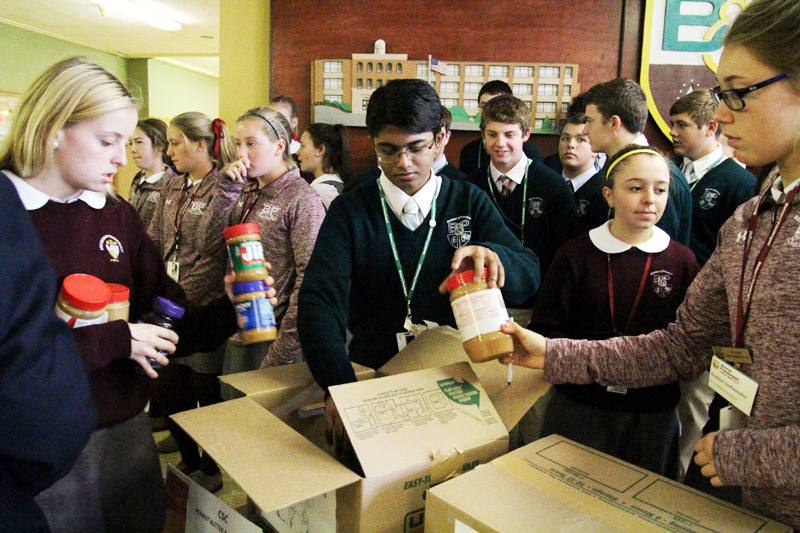
In this file photo, Msgr. Bonner-Archbishop Prendergast High School students box up the peanut butter and jelly they collected for the annual Peanut Butter and Jelly Drive run by archdiocesan Nutritional Development Services (NDS). Recent cuts to federal food assistance programs make Lenten almsgiving more important than ever, said NDS executive director Lizanne Hagedorn. (Photo by Sarah Webb)
Lent is a season for both giving and giving up food, and area faithful can do just that through a number of outreaches coordinated by archdiocesan Nutritional Development Services (NDS).
Through NDS’s “One-Can Meal” food drive, 119 elementary, 17 secondary, and 4 schools of special education in the five-county will help stock NDS’s network of food cupboards throughout the Greater Philadelphia region.
Faculty, staff and students will collect non-perishable “one-can” meals including canned meats, seafood, soups and beans.
[hotblock]
For those who prefer to donate digitally, NDS is also hosting the “One-Can Meal” drive online at https://yougivegoods.com/lentendrive2020. Participants can shop online for an array of non-perishable food items, or for complete “food boxes” ranging from $25 to $250. Tax receipts are available at the time of purchase, and the donated goods will be shipped directly to NDS after the drive ends on April 3.
The donations are especially needed due to recent changes in the federal Supplemental Nutrition Assistance Program (SNAP), said NDS executive director Lizanne Hagedorn.

Lizanne Hagedorn, executive director of archdiocesan Nutritional Development Services, said that giving food to those in need is a “way of giving hope” and of being “in solidarity with people around the world” and even locally who “do not have access to good food.” (Gina Christian)
Effective April 1, more than 90,000 Pennsylvanians will be subject to a new three-month time limit for able-bodied adults without dependents. Individuals aged 18 through 49 without children in their households will only be able to receive SNAP for three months in a three-year period, unless they are exempt or meet a work requirement.
As a result, “people will really will be hurting come toward the end of the month when they will not have as much money,” said Hagedorn.
“We are looking forward to trying to assist people in any way we can through our emergency food cupboards,” she said.
As part of its focus on healthy eating, NDS is looking for low-sodium and water-packed foods for the campaign, Hagedorn added.
“We’re trying to highlight non-perishable proteins, as well as fruits and vegetables as much as we can,” she said. “(Starches) have a place, but I think it’s important for people to get the protein and the vitamins and nutrients that they need.”
Last year, NDS collected almost 19,000 pounds of non-perishable goods for its “One-Can Meal” initiative.
Lenten food drives help fulfill the season’s call to almsgiving, said Hagedorn, while inviting the faithful to stand “in solidarity with those people around the world and even within our own communities who do not have access to good food.”
For that reason, area faithful are also encouraged to participate in the Archdiocese of Philadelphia’s 45th annual Catholic Relief Services’ (CRS) Rice Bowl initiative, which provides people of all ages with ways to incorporate fasting and almsgiving into their Lenten journeys.
In 2019, the archdiocese raised $394,000 through the Rice Bowl program, with some $295,000 (or 75% of the total) supporting CRS’s humanitarian response and development programs in more than 100 countries. Approximately $98,500 (25%) was directed to archdiocesan Nutritional Development Services (NDS) to support hunger and poverty relief at 50 local food cupboards and soup kitchens.
Through the Rice Bowl initiative, CRS also seeks to address technological and economic gaps that can reinforce poverty in developing nations. Funds support projects that improve access to clean water, health and nutrition services, agricultural expertise and small business financing.
More than simple collections of canned goods and spare change, Lenten food drives are a way “of giving hope,” said Hagedorn.
“I think in giving you receive, and what we get back is knowing that we have helped someone come to the table today, or for a couple of days,” she said. “And that is our hope, that everybody can come to the table.”
***
For more information about the Lenten food drive, please contact Denise Hopkins at 215-895-3470 ext. 77823 or dhopkins@ndsarch.org.
PREVIOUS: Canada’s safe injection sites show flawed model for Phila.
NEXT: Archdiocese calls for protection against coronavirus at Mass



Share this story